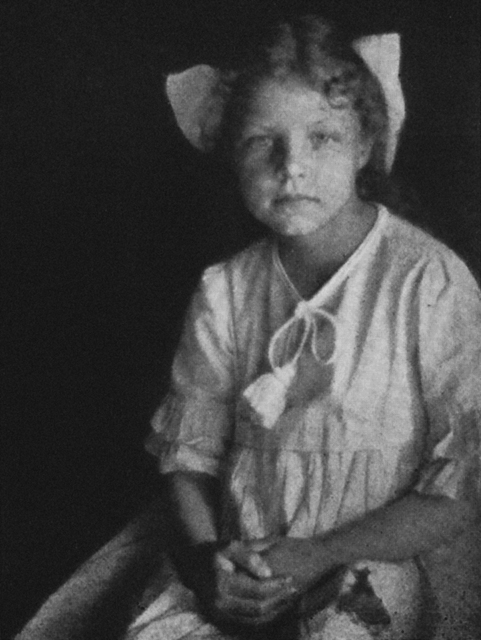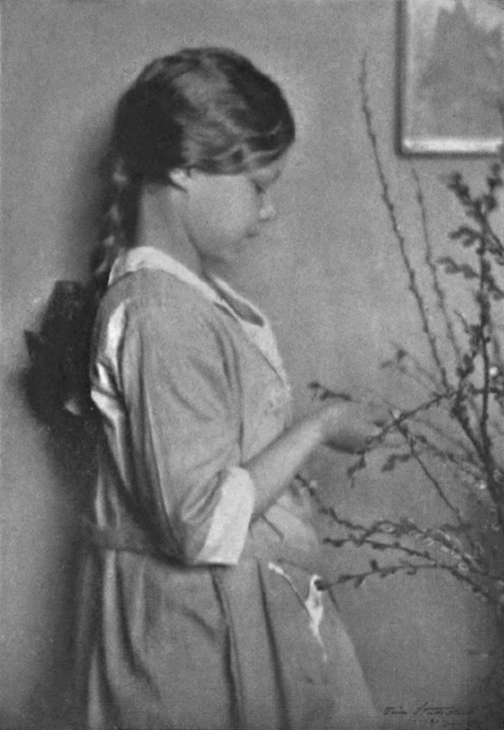
Hilda Conkling (October 8, 1910 — June 26, 1986) was an American poetess, who composed all her poetry between the ages of four and fourteen.
Her father Roscoe Platt Conkling died when she was four years old, leaving his widow Grace with two daughters, Hilda and her sister Elsa, older than her by two years. The three lived together in Northampton (Massachusetts), a town surrounded by woods and hills. Grace Conkling was herself a poetess and a college lecturer in English. She read out beautiful literature to her children, introducing them to the best books at an early age. She was also a musician and played fine music to them on the piano. Hilda and Elsa had thus a deep relationship with their mother.
One fall day Grace and her two daughters were walking through the woods. They stopped to rest, and little Hilda, who had just turned four, climbed into her mother’s lap and announced, “I made up a poem for you, Mother.”
Grace asked, “Can you say it for me?”
“Yes,” Hilda replied, and began:
“The blossoms will be gone in the winter:
Oh apples, come for the June!
Can you come, will you bloom?
Will you stay till the cold?”— Kathleen Murphy, “Hilda Conkling, Child Poet”
So began her poetical career. Hilda did not write down her poems herself, she recited them to her mother, who wrote them down in the moment or from memory later, and would then read the lines back to Hilda, who would correct any deviation from her original words. As Hilda grew up, her mother stopped copying her poems down, so Hilda made fewer and fewer poems, and by the time she was in high school, she had stopped creating them altogether.
Hilda published three books of poetry. Poems by a Little Girl, with a preface by the poetess Amy Lowell, was published in 1920, when she was just ten. Shoes of the Wind appeared in 1922 and Silverhorn in 1924; the latter is a selection of poems from the her two previous volumes, with illustrations by Dorothy P. Lathrop. Her poems were also included in anthologies or published in magazines.
Hilda never married and lived with her mother until the latter’s death in 1958.

I have selected here a few poems from her first volume Poems by a Little Girl. First the last two of her “First Songs”, written when she was four years old; these two speak of love, they are probably addressed to her mother.
XI
I will sing you a song,
Sweets-of-my-heart,
With love in it,
(How I love you!)
And a rose to swing in the wind,
The wind that swings roses!XII
Will you love me to-morrow after next,
As if I had a bird’s way of singing?
The next one was composed when she was aged five or six. It expresses deep emotions with simple words.
SUNSET
ONCE upon a time at evening-light
A little girl was sad.
There was a color in the sky,
A color she knew in her dreamful heart
And wanted to keep.
She held out her arms
Long, long,
And saw it flow away on the wind.
When it was gone
She did not love the moonlight
Or care for the stars.
She had seen the rose in the sky.Sometimes I am sad
Because I have a thought
Of this little girl.
I have chosen a last one about love, composed between the ages seven and nine. Hilda talks of three types of love, which reminds me of the books The Four Loves by C. S. Lewis and Lovestyles by J. A. Lee, which I discussed in a recent post. But her “classification” of loves owes much more to fantasy and imagination.
THREE LOVES
ANGEL-LOVE,
Fairy-love,
Wave-love,
Which will you choose?
Angel-love . . . golden-yellow and far white . . .
Fairy-love . . . golden yellow and green . . .
Wave-love . . . scarlet and azure blue . . .
Which will you choose?I will keep them in a box
Locked with a twisted key.
I will give them to people who need love,
I will let them choose.
Fairy-love blows away like leaves.
Angels I know little about.
For myself I choose wave-love
Because of the wind and the sea and my heart.
Bibliography:
- Kathleen Murphy: “Hilda Conkling, Child Poet”.
- “Hilda Conkling”, Allpoetry.
- Hilda Conkling, Poems by a Little Girl (1920). Electronic version available on Fullbooks.com and Project Gutenberg. Digitisation of the original edition on Internet Archive.
- Internet Archive digitisation of texts on or by Hilda Conkling.
Previously published on Agapeta, 2015/12/09.

